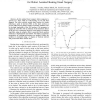Free Online Productivity Tools
i2Speak
i2Symbol
i2OCR
iTex2Img
iWeb2Print
iWeb2Shot
i2Type
iPdf2Split
iPdf2Merge
i2Bopomofo
i2Arabic
i2Style
i2Image
i2PDF
iLatex2Rtf
Sci2ools
120
click to vote
IROS
2007
IEEE
2007
IEEE
Improved prediction of heart motion using an adaptive filter for robot assisted beating heart surgery
— Robot assisted heart surgery allows surgeons to operate on a heart while it is still beating as if it had been stopped. The robot actively cancels heart motion by closely following a point of interest (POI) on the heart surface—a process called Active Relative Motion Canceling (ARMC). Due to the high bandwidth of the POI motion, it is necessary to supply the controller with an estimate of the immediate future of the POI over a prediction horizon. In this paper, a prediction algorithm, using an adaptive filter to generate future position estimates, is implemented and studied. The effects of predictor parameters on tracking performance are studied. Finally, the predictor is evaluated using a 3 degrees of freedom test-bed and prerecorded heart motion data.
Related Content
| Added | 03 Jun 2010 |
| Updated | 03 Jun 2010 |
| Type | Conference |
| Year | 2007 |
| Where | IROS |
| Authors | Timothy J. Franke, Ozkan Bebek, Murat Cenk Cavusoglu |
Comments (0)

